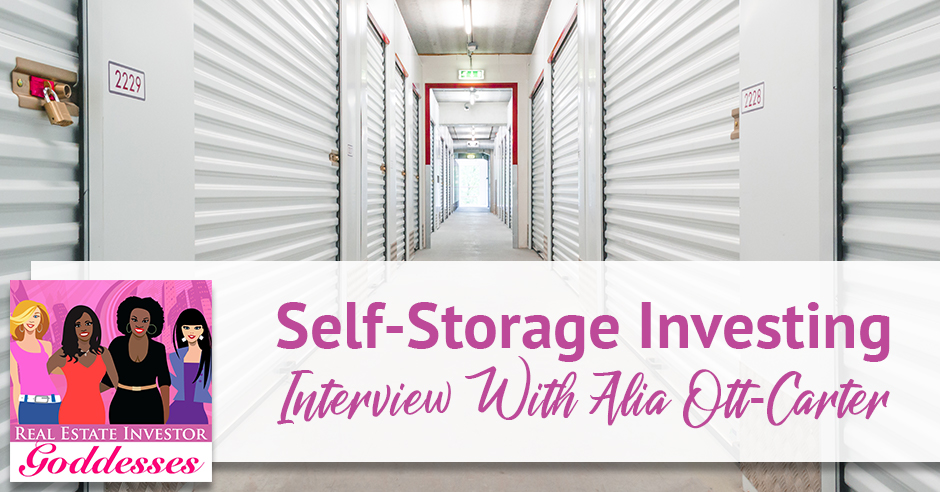
While not the kind of asset that most investors would find themselves going after, self-storage units are probably among the wisest investments you could make. These durable properties are much more recession-proof than many might realize because at any time, you will always find people who are in need of the space that you provide. Alia Ott-Carter is the Owner of Capital Storage Fund. Alia sits down with Monick Halm to talk about why you shouldn’t be underestimating the value of self-storage units as a real estate investor. Alia’s story and experiences offer a unique, lived-in perspective on these kinds of properties that you should definitely take into account.
—
Listen to the podcast here:
Self-Storage Investing – Interview With Alia Ott-Carter
I’ve invited Alia Ott Carter to talk to us about her fascinating experiences with real estate, especially with self-storage. Self-storage is a super unique asset class. It has a reputation for providing relatively high yield and being quite recession-resistant. I’ve personally been fascinated to learn more about it. I’m super excited to have Alia here, who is a self-storage investor and expert. She’s the Cofounder of Investors in Action and Manager of the Capital Storage Fund. Alia has acquired thirteen self-storage properties, a 125-lot mobile home park, family rental units, and managed over $30 million in a lending transaction. Prior to investing, she served as director for philanthropy programs that raised over $1 billion online. She’s passionate about financial literacy programs and helping educate other investors. She’s a sister in my heart because I’m passionate about that, too. She holds a degree in Communications from Chapman and Project Management Certification from Stanford. She is the Coauthor of the books Initiative and Self-Storage Investing Success Kit. I’m thrilled to have her. Welcome, Alia.
Thank you, Monick. It’s great to be on your show.
We were talking about all of the asset classes that you’ve invested in. How did you get started in real estate investing?
My beginning started young with the mindset around becoming an investor. I had the mindset when I was a teen or even before that. My parents had a rental property and we would go back and forth to Hawaii to go on vacation. Sometimes, the vacation included lots of painting, rehabbing, and turning over the unit to a new tenant. I saw how that was able to afford my family a different type of lifestyle. I knew that was in my future. I just had no idea to what extent I would be involved. I certainly didn’t think I would be involved in commercial assets. Along the journey, I ended in the self-storage investing arena. I’ve done rental properties and private lending. I’ve owned a mobile home park and a lot of nonperforming note assets. My favorite thus far has been self-storage.
What was your first investment property? What was the first thing you got?
The first investment property I purchased was a single-family home. My intention was to make some minor improvements to it. It ended up needing to be half torn down. Overnight, I became a general contractor for my property, which was interesting. I had the good fortune of having some close friends being involved in the construction industry. One person was the electrician, another person was the framer, and another person did all of the roofing, windows, doors, and everything. Date night with my boyfriend at the time became a trip to the landfill to take whatever miscellaneous items we had destroyed the previous week. We would go right from the landfill to Home Depot and fill up with all kinds of merchandise for the following week and weekend. That was my life for several months. We rebuilt the back half of this house. We added about 800 square feet in addition to what was currently there and remodeled the rest of the house. It was a pretty big undertaking, unlike some people that might just paint, carpet, and get some contractors in there. I had half the house torn down and that was a pretty big deal.

Self-Storage Units: Self-storage is one of the best recession-resistant assets you could acquire in terms of real estate.
Did you buy and hold? Did you flip? What did you do with that house?
It was a long-term buy and hold. The intention was to live in it for two years. When you live a house for two years, you could avoid paying the capital gains tax up to $250,000 per single person or 500,000 for a married couple. I had the idea of slowly building my portfolio that way. It ended up being about fourteen years before I sold that first home. I pulled it for quite a big profit but part of that was going through this whole cycle of the ups, downs, and up again in the real estate market. I did pretty well on that property. In the meantime, I also chose to invest in some other rental properties, some in-state, and some out of state. It evolved into where I’m at now.
Let’s talk about where you’re at. Your focus is self-storage. How did you get into self-storage?
It was the confluence of timing and having capital available. My business partner, Terri, and I had been doing a number of lending transactions on a fix and flip properties in Southern California. At that moment in time, we weren’t sure if the market was going to turn. We took back two properties and we had to complete the rehabs ourselves on those two properties. We realized how transactional our business was and what the risks were associated with it. We weren’t just doing lending in first position, we were also lending in second position. We were the gap funder. There might be one hard money lender that would lend 70% but if the borrower needed more money for the rehab, they could come to us.
We would put in some additional capital for these rehab costs. We did take two properties back because of that. After hitting one home run after another, it was a profitable business up until that point. We don’t like making mistakes. We got a little hard on ourselves and said, “How do we never do that again?” We came out of pocket to pay our investors back and made sure everybody was whole. That came with our own cost of time and money. We wanted to make sure that we were investing in assets that are cash flowing even if they’re in a turnaround process. Right about that time, my business partner Al, who I had already purchased the mobile home park with, came to us.
Self-storage is an extremely unique asset class. Share on XHe’s been an expert in self-storage for a number of years. He came to us asking for a loan. It was a gap funding loan to help purchase a self-storage facility. We looked at the deal. The deal was essentially the same price as a single-family home, except this was almost a 300-unit apartment complex with a dance studio and parking lot. It had so many units already cashflowing. We knew from day one that there was a tremendous upside and the cashflow would pay for the loan with no problems. When we did the financials on it, the numbers made absolute sense for us to get involved. The three of us, as a team, have purchased thirteen properties in that same manner.
As we grew, we have a limited amount of capital. We got other investors involved. We started the fund, which is called the Capital Storage Fund, to allow other investors to participate in our success. That’s worked out well but it’s a journey, for sure. It comes along with confidence in being able to prove out a business model that works over and over again and having a good solid team of people that don’t necessarily have the same skillsets. All three of us have different skillsets that complement each other well. When you have that circumstance where you have 2 or 3 people, maybe more, that are working well together, it’s magic. We’re pleased with how things have gone so far.
There’s so much in what you said that I want to follow up on. Let’s start with self-storage. Tell me more about why you like it as an asset class.
First of all, self-storage is one of the best recession-resistant assets you could be in real estate. When I do my presentations, I have a chart from public storage that shows how they did price per square foot overtime during the recession. There was a tiny little dip in 2009, 2010, and how they were affected by the recession. If you put that chart over a chart with a single-family housing chart, it would be drastically different when we had this downturn between 2008 onwards. The reason why is because when people are in a situation where there’s an upheaval and have to move, there’s always a need for storage. It’s relatively affordable to somebody who may have to go from a house down to an apartment or move in with family members.
They always think that there’s a better day coming. They’re attached to their stuff, whether it be a beat-up couch or a dining room table. There are often some memories or some emotional attachment to those items that they don’t want to get rid of. They put it in storage with the assumption that someday, they’re going to have more space and have a place for all those items again. That’s typically what happens in the recessionary times. You have different types of tenants at different points in the market cycle. However, you also have people who are buying toys, bikes, vehicles, and things that they might recreate during better times.
That’s one reason. If you think about the construction process of a storage facility, it’s a simple construction. Whether you’re building or owning an existing property, you typically have concrete walls or flooring. You have siding as fender blocks or you would have steel construction. It’s a sturdy and efficient construction building. When you have a tenant move out, if they trash it, it means they left their stuff behind. You put it in the dumpster, broom sweep it, and you’re on to the next tenant. You could have that turned around in minutes or hours.

Self-Storage Units: Whether it’s the person who is delinquent or another person who buys the delinquent person’s unit, somebody is going to go in and make sure that the storage unit is cleaned out somehow.
When you have an apartment complex, you could have all kinds of damage to appliances. You could have a destroyed carpet from pets. You don’t have those issues. You also don’t physically have your tenants on site. Most of the time, you might have a handful of people come in throughout the day. In general, most people put their stuff in storage and they come back to take it out six months to a year later. You don’t have that same level of liability and tenant issues. Certainly, people aren’t staying the night. There’s no plumbing. There are no pets. Those are the reasons. The other reason that we like it is that you can handle the delinquency process so much faster than if somebody was living in the unit. You could go to the unit and add a manager’s lock to lock out a delinquent tenant.
They’re forced to go into the office to pay their late fees and whatever they need to catch up on in order to get access to their unit again. You can’t throw a padlock on somebody’s dwelling. There’s a different level of motivation for people. If they want their items, they just have to pay. If they don’t, it goes to auction relatively quickly. You have to follow the state laws that govern lien laws. When these items go to auction, they’re purchased by an everyday person. It might be somebody who owns a thrift store. They purchase everything that’s in that unit and they are responsible for broom sweeping it and getting it ready for the next tenant. Somebody pays someone, whether the person who’s delinquent or the person who buys the delinquent‘s person unit. Somebody is going to go in and make sure that the unit is cleaned out.
What are the challenges of having self-storage?
The greatest challenge with self-storage is making sure you have a great manager. That manager is responsible for everything from collections to making sure that your customers are happy. You just need to make sure that you have the right person in charge. We had one property. When we acquired the property, the managers didn’t care. They were probably one of the main reasons that the property had a high delinquency rate and a low occupancy rate. They were hardly ever physically there on the property before we added an office to the property. They were brokers who lived down the street. People would call to make a rental reservation. Sometimes, they would show up, and sometimes, they wouldn’t. We had cameras.
We would ask them about the condition of the property and they’d go, “It’s been taken care of.” We could see weeds that are three feet tall. We knew that those managers had to go. Now, we have a new manager in there. She is making huge strides on that property. It goes to show that the person in your property management seat can make all the difference. I think that’s true for any asset class. When you have delegated the responsibility of the property management to somebody, it’s a big responsibility. You need to make sure you have the right person. You need to train and treat them well, too.
Most people just put their stuff in storage and take it out six months later. Share on XUltimately, you’re buying real estate but you’re also buying a self-storage, so you need to make sure that you have the proper people running the business. I always ask this question of my guests because we learn so much more by things that don’t work out than we do when things are smooth sailing and easy. What would you say your biggest mistake has been in your real estate investing career and what did you learn from it?
I’ve learned so much from mistakes like you said. On my first property, I didn’t do enough due diligence. There was a lot of pressure to purchase quickly on that property even though I bought it with a bank loan. The pressure to buy superseded my due diligence in understanding exactly the condition of the existing addition that I eventually had to tear down. Had I known more of what I know now, I would have maybe not purchased that property but I’m glad I did. I learned so much from the construction process. That would have been one mistake. It has to come down to the nitty-gritty details of making sure, when you’re underwriting a borrower, that they’re the right person and is trustworthy of your funds.
We had done so many transactions with one particular broker that we implicitly trusted who they were putting in front of us. That was a mistake because even though they did their homework and level of due diligence and checked a lot of boxes, there were still some boxes that weren’t checked. We looked at ourselves and took responsibility for that. We could have done just as much homework as the first broker did who brought us the deal. We could have done more homework on what was being done on the property. As Reagan would say, “Trust but verify.” We trusted but we didn’t verify enough. We learned from that mistake to verify critical details. Whenever you see an issue arise, that voice inside your head, your gut, or whatever that feeling is that something isn’t quite right. I now go deeper into investigating why I’m feeling that way to make sure that something funny isn’t going on. My biggest Achilles heel is that I do trust. Now, I have a team that I work with to verify.
On both sides of those mistakes is about due diligence on the properties. The people that you’re working with. Also, listening to that intuitive voice inside.
I would add one more to that on the people side of things. When you’re partnering up with people, partner up with the right people. I’ve had a lot of partnerships that go well. I’ve had a handful get a little crazy. Fortunately, I’ve never had a bad partner in the sense of somebody cheating me but I’ve had challenging partnerships nonetheless. A lot of times, when people get started in real estate, they look around to their best friends and family members to get started with. Everything is rosy in the beginning. You need to know how people are going to play when things get challenging. That’s why I’m so grateful. I have a great solid team of people surrounding me.
The team is so important. It’s about getting people with complementary skillsets. Sometimes, you can have somebody you love but they’re so similar to you that if both of you are thinking of doing the same thing, one of you is redundant. That’s great advice of partnering with the right people. I often tell my mentoring students and clients that whenever you’re getting into a new relationship with somebody, you want to talk and actually put it on paper. Have a contract with what will happen when things don’t go well. In the beginning, we always think things are going to go perfect. It’s always going to be smooth sailing. The more you can talk about those things at the frontend about what happens when things don’t go right and who’s responsible for X or Y, the more clarity you get at the beginning, and the more likely you are to save that friendship later.

Self-Storage Units: Having a great, solid team of people surrounding you is one of the most important things that you can have.
You said it well. Document that relationship as much as you can conceive of all the possible things that could go wrong or ways that that business could go. Document and think through those things upfront. I have had to refer many times, in this one particular partnership, back to our operating agreement over and over. We would take good minutes of our meetings. I would have to go back to the minutes of meetings. Sometimes, after 1, 2 or 3 years go by, you forget how things are to be when a certain thing arises. If you have that document, you go back to the operating agreement or notes along the way and say, “This is what we agreed to.” It becomes an old conversation.
On the flip side to your biggest mistake, what are you most proud of in your real estate investing career?
I believe it’s the lifestyle that it can create for you. There are so much more meaningful things in my life than just real estate but it gives me the ability to have time freedom. In my opinion, that’s irreplaceable. I got approached for a job offer. It wasn’t a 9:00 to 5:00 office gig. I thought about it for two seconds and I realized that I’m not cut out for that anymore. Even when I had a full-time job I was working from home, I would sometimes start at 5:00 AM or 9:00 AM if I chose to. I had flexibility in that. The thing that I’m most proud of is having the intention of creating a certain lifestyle and working determinately to get that lifestyle.
Having gone through the journey of different real estate asset classes and techniques, I continue to refine and improve on how to make this better. “This is going well. How do I make this better?” “This isn’t working anymore. How do I shift into something that’s working for my ability to be flexible and create that lifestyle?” It’s the whole scope of real estate overall. It’s not just one thing in real estate. Of course, I’m proud of our team, Terri and I, the partnerships and relationships that we’ve developed over the years, and our partnership in general. Our ability to work with Al on these storage properties has been great. I appreciate having found the right people to be in this industry.
To what do you attribute your success?
A lot of determination and focus. I know in my gut that I love real estate as a vehicle to get me to where I want to be. I also attribute success to thinking outside the box and having lots of great mentors who have been part of this journey with me. Some of them aren’t even involved in any type of real estate transaction that I’ve ever done. You extract 1 or 2 nuggets or you spend time with them. The people that they are uplift you. I intentionally surround myself with quality people. I tend to shy away if I get a sniff of inauthenticity or somebody who I think is going to cheat me. I might learn from them. I might quietly sit in the back of the room and take learning lessons from them but I won’t engage with them. That’s a big part of my success, making sure I’m surrounded by the right people. I think you see a theme here.
We have to take a look at ourselves, and take responsibility for any mistakes we make along the way. Share on XIt makes sense. Real estate is a relationship game. It’s a team sport. In my opinion, it has everything to do with who you’re working with. You can get the best property but if you’re the wrong team, it’s going to be terrible. You can get a mediocre property with a great team. You can do great. You’re right. Your mentors, peer group and everything have much to do with your success. What advice would you have for a woman who’s just starting out in this field?
I would tell her that she can do this. There is a growing number of women who are getting involved in self-storage and real estate, in general. I would surround myself with the right people. It doesn’t matter if you’re surrounding yourself with smart women or smart men. There are a lot of quality people out there in any niche of the real estate industry, who are waiting to share their knowledge and expertise review. If you are looking to start in self-storage, in particular, you can go online. We have lots of videos on YouTube. We have some training materials on our website, InvestorsInAction.com.
I would also look at ISS and the Self-Storage Association. ISS stands for Inside Self-Storage. Both ISS and the Self-Storage Association provide several large conferences throughout the year in different locations. They’re good about providing you with thorough access to vendors, brokers, lenders, and anybody who has a major stake in the self-storage industry. You can go to these conferences and learn a ton. You could go to the right courses and might have five classes going on simultaneously. You pick the one that fits you best for where you are at in your journey. Learn and start connecting with people. That’s what I would recommend.
For people to find out more about you and to reach you, you’re at InvestorsInAction.com.
Our fund website, where you can learn more specifically about what we’re doing in self-storage is CapitalStorageFund.com. I’m on pretty much all the social media, on LinkedIn, Facebook, Twitter, and YouTube. I’m connectable.
We’re going to conclude with a trinity, which is how we conclude every show. A trinity is a brag, gratitude, and desire. We’d love a brag. What’s one thing you’re celebrating right now?

Self-Storage Units: If you’re going into a relationship with someone close to you, make sure you document that relationship, and conceive of all the things that could go wrong.
One thing I’m celebrating is selling my mobile home park. That was an asset that I held on to for five and a half years. It was full of interesting challenges and relationships. I learned so much from that. I’m so grateful that it’s over. When you want to focus on one thing and you have this chatter going on inside, being able to release yourself from something that’s slightly holding you back is freeing. I felt like the day that property sold was the day I got my wings.
What’s one thing you’re grateful for?
I did mention this a few times but I am grateful for my team. I am grateful for my partnership with Terri. She has been a huge asset to me in complementing who I am as an investor and as a person in life. Also, the relationships that I have around me, whether it’s my husband, his kids, and my friendships. I’m grateful for the people in my life.
Lastly, what’s one thing you desire?
Not so secretly because I’m putting this out there on the blog. My husband and I have been working towards adding an addition to our family. We added a dog to the family but we’re looking to add another human to the family. Like anything, there are different ways of accomplishing that journey and we’re exploring several of them. My next desire is to officially become a mom with either my own biological children or adopting.
Shall it be or so much better than you can ever imagine. Thank you so much for the great interview. I loved your story and in finding out about self-storage. I can’t wait to find out more. If you readers out there want to connect with Alia, you can find her at InvestorsInAction.com, CapitalStorageFund.com, or all over social media. To connect with me, go to RealEstateInvestorGoddesses.com. You can get a copy of the free eBook, Real Estate Success Blueprint: 7 Crucial Steps Every Woman Must Take to Be a Successful Real Estate Investor. You can join our Real Estate Investor Goddesses Investor Clubs. You can have access to all sorts of different investments that we have vetted and have available for you. Join our community of sister goddesses in real estate. We have tons of info and content for you. You can find it on my website. Alia, thank you. This was great. Thanks to all of you for being here. We’ll catch you next time with another Real Estate Investor Goddess superstar episode. Bye.
Thank you, Monick. Bye.
Important Links:
- Investors in Action
- Capital Storage Fund
- Terri Garner – LinkedIn
- ISS
- Self-Storage Association
- LinkedIn – Alia Ott Carter
- Facebook – Alia Ott Carter
- Twitter – Investors in Action
- YouTube – Alia Ott Carter
- InvestorsInAction.com
- CapitalStorageFund.com
- Real Estate Investor Goddesses Investor Clubs
- Real Estate Success Blueprint: 7 Crucial Steps Every Woman Must Take to Be a Successful Real Estate Investor
About Alia Ott Carter
 15 Years of Wealth-Building Through Real Estate Investments –
15 Years of Wealth-Building Through Real Estate Investments –
– Fund Manager, Capital Storage Fund (Self Storage)
– CEO of Investors in Action
– Leader for Investment Education
– Licensed Real Estate Broker
We have over 45 years of combined fundraising and real estate investing experience on both residential and commercial properties. Our capital team is currently focused on the acquisition of self storage facilities with value-add opportunities.
With a decade of experience in corporate philanthropy and nonprofit space, I believe each of us can make a difference when we empower people with the resources, mindset and opportunities they need to achieve success. I have an unstoppable fire of being a change agent for good – real estate is a wealth creation vehicle, but what defines me as a human is far beyond that. My passions include teaching financial literacy & entrepreneurship to the next generation, as well as optimizing businesses with systems, stronger teams and a sense of social responsibility – creating a positive and sustainable impact in our communities.
Love the show? Subscribe, rate, review, and share!
Join the Real Estate Investor Goddesses Community today:





